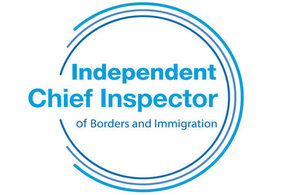An inspection of the handling of complaints and MPs’ correspondence, July to September 2015
The Chief Inspector has released his report of the handling of complaints and MPs’ correspondence.

How well a public body handles complaints about the service it provides, or about the conduct of its staff, is rightly regarded as being a key measure of its performance, as well as having a significant impact on public perceptions of its work. Good complaint handling requires organisation, effort and commitment from management.
In 2009, the Parliamentary and Health Service Ombudsman (PHSO) published Principles of Good Complaint Handling, which identified 6 key principles to help public bodies deliver first-class complaint handling to their customers. These included being customer-focused, being open and accountable, acting fairly and proportionately, and putting things right.
The UK Borders Act 2007 sets out that the Independent Chief Inspector shall consider and make recommendations regarding the efficiency and effectiveness of the handling of complaints in respect of immigration and customs functions for which the Home Secretary is responsible.
This inspection examined the efficiency and effectiveness of the handling of complaints and MPs correspondence by Border Force, UK Visas and Immigration and Immigration Enforcement. In doing so, it relied heavily on the PHSO’s 6 principles as the most appropriate benchmark for assessing the Home Office’s performance.
The inspection found evidence of good practice, in particular the ‘clear and simple’ procedures for making complaints, which were accessible through Home Office websites and in leaflets and posters, and the proactive and personalised service provided to MPs, which had improved the quality and timeliness of responses significantly since this area was inspected in 2010.
However, the inspection also found areas where there was considerable room for improvement, specifically regarding inconsistent guidance for complaint handlers, poor record-keeping, including tracking of complaints to ensure that they receive a satisfactory and timely response, and failure to pursue all reasonable lines of enquiry in respect of minor misconduct complaints.
These findings echoed a report issued by the PHSO in November 2015, based on its investigation of 158 complaints from 2014 to 2015, which referred to the Home Office’s poor complaint handling, citing delays, poor decision-making and not doing enough to put things right and learn from mistakes.
This report makes 8 recommendations for improvement:
-
Conduct a fundamental review of current guidance in relation to complaints handling and ensure that guidance is concise, unambiguous and practical, covering as a minimum: * For customer-facing staff: the recording and reporting requirements for locally resolved complaints, for unresolved complaints and for complaints about other business areas. * For staff responding to written complaints about minor misconduct and service: the details to be included in the response regarding whether or not the complaint is upheld, what further steps (if any) will be taken and the option of requesting a review if not satisfied. * For staff responsible for maintaining the record of complaints: what needs to be recorded regarding whether or not the complaint is upheld, and the actions that have or will be taken and by whom.
-
Put in place sufficient management and/or quality assurance checks to ensure that guidance is being applied as intended, that the investigation of complaints is thorough and impartial, that responses deal with the substance of the complaint, and that remedies are appropriate.
-
Ensure that, where requested, the response to a request for a review of the handling of a complaint notifies the complainant of their options should they remain dissatisfied.
-
Review the stated aim to respond to all complaints within 20 working days and either take steps to ensure that it is achieved in 95% of cases, in line with the published service standard, or revise it to provide complainants with a realistic timescale for a response.
-
Ensure that complaints are acknowledged in line with guidance and, where it is likely that the 20 working day target for a substantive response will not be met, that complainants are notified and provided with regular updates until provided with a substantive response.
-
Ensure that the Complaints Management System (CMS) is used to track the full history of a complaint from receipt to resolution, keeping the CMS record open until a substantive response has been provided to the complainant, recording accurately the details of any investigation and its findings, and retaining a copy of the original complaint and the response on the system.
-
Ensure that a thorough and fair investigation is conducted of all minor misconduct complaints, taking all reasonable steps, including checks against Home Office systems and records, to identify the subject of the complaint where this is in doubt.
-
In order to ensure compliance with guidance, greater consistency, and better quality assurance, retain ownership of complaints and responsibility for providing a substantive response within an appropriately resourced, dedicated correspondence team, which is empowered to require contributions from the relevant business area where necessary.
-
Full report: An inspection of the handling of complaints and MPs’ correspondence
-
The Home Office response to the Chief Inspector’s report on complaints and MPs’ correspondence
The finished report was sent to the Home Secretary on 7 January 2016.